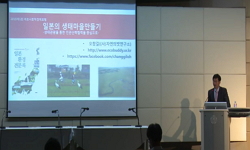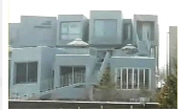Recent discourses on the development of Jeju Island have raised the issue of 'being a resident' in relation to development in complex ways. This paper explores the meanings of local development and being a member of a local community, showing that the...
http://chineseinput.net/에서 pinyin(병음)방식으로 중국어를 변환할 수 있습니다.
변환된 중국어를 복사하여 사용하시면 됩니다.
- 中文 을 입력하시려면 zhongwen을 입력하시고 space를누르시면됩니다.
- 北京 을 입력하시려면 beijing을 입력하시고 space를 누르시면 됩니다.

변화하는 제주도 개발 담론과 마을 주민 성원권의 젠더정치 = Gender politics of Membership in Changing Development Discourse of Jeju-island
한글로보기https://www.riss.kr/link?id=A108648795
-
저자
김상애 (제주대학교)

- 발행기관
- 학술지명
- 권호사항
-
발행연도
2023
-
작성언어
Korean
-
주제어
Development ; Village ; Membership ; Place ; Social Reproduction ; 제주도 개발 ; 마을 ; 성원권 ; 장소 ; 사회적 재생산
-
등재정보
KCI등재
-
자료형태
학술저널
- 발행기관 URL
-
수록면
3-36(34쪽)
- 제공처
- 소장기관
-
0
상세조회 -
0
다운로드
부가정보
다국어 초록 (Multilingual Abstract)
Recent discourses on the development of Jeju Island have raised the issue of 'being a resident' in relation to development in complex ways. This paper explores the meanings of local development and being a member of a local community, showing that the gender politics of village membership, place and community underlie the discourse of 'village development'. In Bengdi village, the meaning of local development was constructed in relation to the context of village life. While the development of Jeju was understood as a socio-economic process independent of the village, the development of the village was seen as essential for the social reproduction of the village. Village development projects were based on gendered participation, bringing different experiences of development to men and women in the village. This draws attention to the fact that the 'local people' that development, progress or conservation normatively presupposes is not a homogeneous group with a single set of interests, but a complex community of gendered members. Using a feminist post-development approach, this article shows that the power relations that local development discourses reshape are rooted in gender politics.
국문 초록 (Abstract)
최근 제주도 개발을 둘러싼 담론에서는 개발과 관련하여 주민의 권리 및 자격, 참여 등 ‘주민됨’의 문제가 복잡하게 제기되고 있다. 이 연구는 제주도 마을의 현장 연구를 통해, 지역의 개...
최근 제주도 개발을 둘러싼 담론에서는 개발과 관련하여 주민의 권리 및 자격, 참여 등 ‘주민됨’의 문제가 복잡하게 제기되고 있다. 이 연구는 제주도 마을의 현장 연구를 통해, 지역의 개발과 주민됨의 의미를 탐구하고, 마을이라는 장소, 그리고 공동체를 둘러싼 성원권의 젠더정치가 ‘마을 발전’ 담론의 근간을 이루고 있음을 드러내고자 했다. 연구 현장인 ‘벵듸’마을에서 지역 개발과 발전의 의미 구성에는 마을에 기반한 삶의 맥락과 밀접하게 관련되었다. 개발이 마을과 무관한, 마을의 것이 아닌 사회경제적 과정으로 이해되었다면, 발전은 마을의 사회적 재생산을 위해 반드시 필요한 것으로 간주되었다. 이같은 맥락에서 추진된 마을 발전 프로젝트는 주민들의 젠더화된 참여를 바탕으로 진행되었고, 마을의 남성과 여성에게 발전과 관련한 서로 다른 경험을 가져다 주었다. 이는 개발과 발전, 혹은 보존이 규범적으로 전제하는 ‘지역 주민’이 이해관계가 단일한 동질적 집단이 아니라, 젠더화된 성원으로 이뤄진 복잡한 공동체라는 점에 주목하게 한다. 이 글은 지역의 개발과 발전에 대한 페미니스트 포스트-발전주의적 접근을 통해 지역의 개발과 발전 담론이 재편하는 권력 관계가 젠더정치에 기반하고 있음을 밝혔다.
동일학술지(권/호) 다른 논문
-
성소수자 인권 제도 이후의 제도화 과정 분석: 서울특별시 학생인권조례 사례를 중심으로
- 이화여자대학교 한국여성연구원
- 김올튼
- 2023
- KCI등재
-
여성주의 번역 윤리와 Kyung-sook Shin/Chi-young Kim의 'Please Look After Mom'의 독자들
- 이화여자대학교 한국여성연구원
- 양혜원
- 2023
- KCI등재
-
장소 기억의 정치와 페미니즘적 재구성 : 서울 창신동에 대한 다층적 의미 구성
- 이화여자대학교 한국여성연구원
- 김미선
- 2023
- KCI등재




 RISS
RISS 스콜라
스콜라







